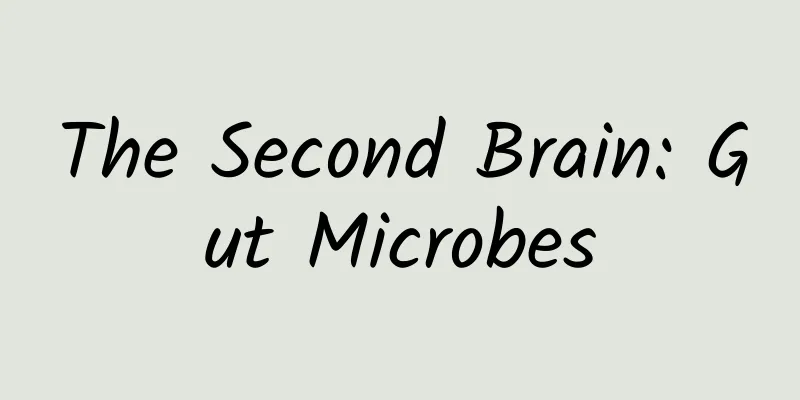The Second Brain: Gut Microbes

|
Friends who have completed nine years of compulsory education all have a certain understanding of the human intestine. It is not only the largest digestive organ in the human body, but also the most important detoxification system. The intestinal system is full of microorganisms, and the number is astonishing, measured in trillions. Its value is currently estimated to be more than 10 trillion and less than 100 trillion! There are countless species, and the most conservative estimate is more than 1,000 species, and even up to 7,000 species. However, due to the limitations of human cognition, as well as separation and cultivation methods, there are only more than 1,000 species of intestinal microorganisms that can be artificially cultivated, which accounts for a small proportion. Don't underestimate these tiny individuals, they are closely related to human health. People know that the state of the intestines will largely affect the state of the human body, but few people know that the real "controllers" are intestinal microorganisms. Physiological (functional) regulation such as digestion, immunity and metabolism cannot be separated from the role of microorganisms. They can even interact with the brain through certain pathways, thereby affecting people's appetite, mood, and rhythm. Many scientists have compared intestinal microorganisms to the "second brain", and research in related fields is in full swing. However, it should be emphasized that calling it the "second brain" does not mean that we should obey these little guys. The term "second brain" is just a metaphor for their importance to the human body. Next, let us take a closer look. Intestinal microbes can affect people's body shape to a certain extent. Scientists represented by Gerald I. Shulman (who works at Yale University School of Medicine in the United States) have obtained evidence indicating that intestinal microbes are related to obesity. His and his colleagues' research shows that after eating high-calorie foods, these "raw materials" are used by intestinal microbes to produce a large amount of acetate. When acetate enters the human brain through the blood circulation, it activates the parasympathetic nervous system. After receiving instructions for hunger hormone and insulin secretion, the stomach and pancreas will "follow the rules" and produce hunger. So people start to "fill their stomachs". Those who neglect to discipline themselves will be in a worse situation and eventually become obese. Obviously, this also explains from another perspective why people know that high-calorie foods are not good for the body, but it is difficult to quit - the more they eat, the hungrier they get, and the hungrier they get, the more they eat. In fact, not only obesity, but also diseases such as Parkinson's (a common neurodegenerative disease) and heart disease are related to intestinal microorganisms. Professor of Microbiology Sarkis K. Mazmanian and his research team found that several microorganisms can synthesize chemicals that induce Parkinson's disease. Compared with healthy people, patients have significant differences in the composition of intestinal microorganisms. The above microorganisms belong to multiple taxa, and some of them are very distantly related. However, which one or which microorganisms play a decisive role has not yet been discovered and needs further research. Regarding heart disease, researchers at the Cleveland Clinic Medical Research Center in the United States have confirmed that regulating intestinal microorganisms can help treat related diseases to a certain extent, which has opened up a new path for the treatment of the disease. In addition, researchers have found that individual bacterial groups in the intestine are related to the production of serotonin, which is associated with the occurrence of some diseases. Do you or someone around you suffer from anxiety or depression? Haha, this may also be caused by intestinal microorganisms. Microbiologist Philip Strandwitz works at Northeastern University in the United States. His research team obtained a strain of intestinal bacteria numbered KLE1738 from the human body. KLE1738 can only feed on γ-aminobutyric acid, which is an inhibitory neurotransmitter that exists in the central nervous system and can relieve anxiety and depression. It is not difficult to imagine that if similar microorganisms in the intestines multiply, the concentration of γ-aminobutyric acid will inevitably decrease, and people will inevitably develop anxiety and depression. Intestinal microbes also have an impact on young children. The mother's bad eating habits during pregnancy will directly reflect the composition and overall functional performance of the intestinal microbes. For example, if the diet during pregnancy tends to be high-fat and high-calorie, the number of lactobacilli will decrease. Don't underestimate lactobacilli. Their absence can cause children to have social disabilities and other obstacles. Fortunately, artificial regulation and supplementation of lactobacilli can overcome the above obstacles. In addition, children with asthma may also be victims of intestinal microbial flora imbalance. Studies have shown that children with asthma often have intermittent intestinal flora imbalance within 100 days after birth. This finding comes from the analysis of 319 samples. Among them, four genera (one of the microbial classification units, conceptually larger than "species" and smaller than "family") of bacteria were significantly missing, and these microorganisms are very likely to be related to childhood allergic asthma. Finally, it should be noted that as a type of organism, intestinal microorganisms also have their own life rhythm (i.e. biological clock). They can make rhythmic movements on the intestinal mucosa, move a little distance (micrometer level) to the right (or left), and then return to their original position, and their rhythm may affect the host's biological clock. How about it, we big guys are actually subject to these little guys, don't you think? -END- *This article was first published by "The Fat Devil's Microbial Front" (WeChat ID: nldxhjwswx). Any media reprinting must retain the name and WeChat ID of "The Fat Devil's Microbial Front". Any changes, including the title, are strictly prohibited without permission. *Most of the pictures in this article are from the Internet. Please inform us if there is any infringement. We welcome your comments on the content. Everything is for better science popularization. |
Recommend
Why do people say LCD screens are dead and OLE is the future?
In 2016, China's LCD panel production capacity...
Product operation: overall operation framework ideas for content marketing!
Content marketing is divided into three aspects 1...
In this lonely universe, are humans an exception?
In this lonely universe, are humans an exception?...
The 10 most popular growth hacking strategies in 2018!
We feel it’s necessary to share with you our rese...
The final struggle: Trump bans eight Chinese apps including QQ and Alipay
If nothing unexpected happens, January 20, 2021 w...
Watch Nongmin Films for free as a VIP, and watch all VIP movies online for free!
You can watch VIP TV series for free on Nongmin F...
The protagonist of "The World" died of stomach cancer. What habits are harmful to the stomach? What should we do to prevent stomach cancer?
The protagonist of the hit TV series "The Wo...
The evolution of AI technology is underestimated by the public
ChatGPT, recently launched by OpenAI, has become ...
Why does this duck look so plump?
The Winter Paralympics has begun. Speaking of the...
Are systems and software drivers becoming slower and slower as they are upgraded? Talking about common "negative optimization"
There has been a lot of talk about "negative...
Modularity and AR phones: Did Lenovo bet on the right trend?
Not long ago, Lenovo held the Tech World Technolo...
The game behind Taobao's anti-counterfeiting campaign
Yesterday, Taobao released its 2014 anti-counterf...
Shadow video live streaming
Introduction to the live streaming resources of S...
With TV games flooding the market, Huanzhong Technology's "Fibble" had over a thousand downloads on its first day of release?
The advent of the OTT era has provided an opportu...
What are the benefits of having a mini program in a physical store?
Nowadays, in the Internet age, many store owners ...









